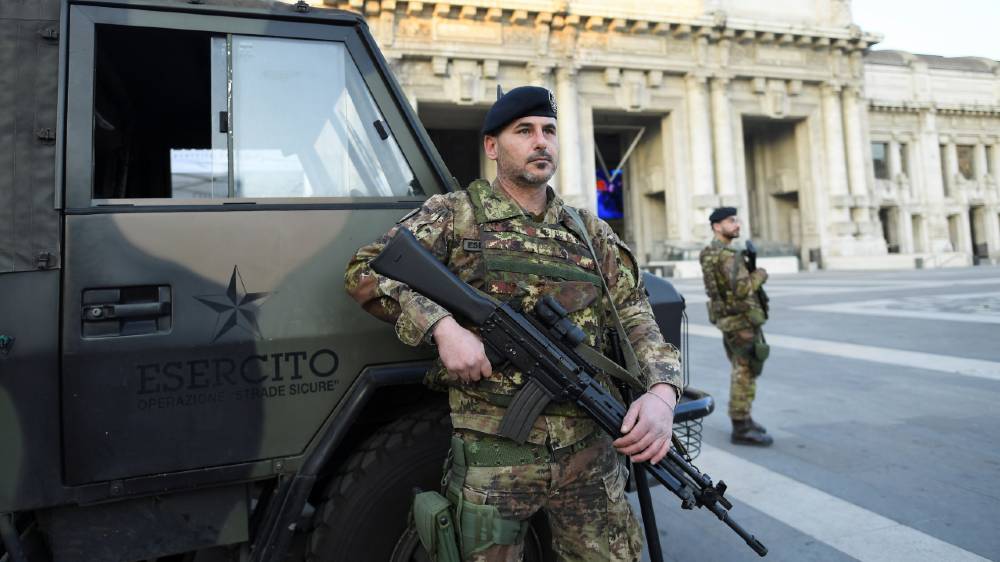UK vs Italy: A tale of two lockdowns
Britons are still adjusting to the idea of social distancing, while Italians have faced much more severe measures.

London, United Kingdom – A word’s meaning can sometimes get lost in translation as it crosses borders.
That seems to be happening to the term “lockdown”. About one-third of the world’s population has now had its movement restricted in the fight against coronavirus, but those restrictions vary so substantially from country to country that one word is being used to describe very different experiences.
Keep reading
list of 3 itemsFears grow for Italy’s non-coronavirus patients at back of queue
Italy shuts down more industries, but critics say it’s not enough
In the United Kingdom, citizens are still getting accustomed to what one British newspaper headlined: “The End of Freedom”. The government’s message is now clear: stay home. No gatherings allowed.
Bars and restaurants are shut. Schools have closed. Outings are for essential reasons only, like food shopping and caring for the vulnerable. Even though Britons have been watching similar scenes unfold in Europe in the previous weeks, it is still a shock to be living under the most severe restrictions on the movement known in peacetime.
On the other side of the English Channel, “lockdown” means something much more severe. The UK is still allowing one hour of outside exercise a day, often in parks that remain open. That would be a luxury for millions of Europeans who are only permitted the occasional trip to the supermarket. Italians face questioning, fines and potential jail sentences if found outside without a valid reason. In Italy’s hard-hit Lombardy region, dogs can only be walked within a radius of a few hundred metres from one’s home.
Drones and anonymised mobile phone data are being used to track the movement of citizens. The only sound from the streets is either from a megaphone warning people to stay indoors, or an ambulance siren.
A montage of local mayors swearing at lockdown dodgers has gone viral due to its colourful language – one mayor threatened to send police armed with flamethrowers if anyone held a graduation party – but it does show how much pressure is being put on citizens to respect the lockdown. The UK may also be on lockdown but, for now at least, it feels very different.
The more restrictive Italian strategy has been in place for weeks, but is it working? At long last, there is some hope that it might be, as new figures suggest the rate of contagion has been slowing in the past few days.

Milan-based doctor Matteo Ferrari is cautiously optimistic and thinks the more stringent restrictions are key to controlling the virus.
He has more reason than most to hope the contagion’s peak will soon be reached. He has been on the frontline of this crisis from the beginning, and has not hugged or kissed his two daughters goodnight in weeks. He sits down for dinner with them, but on the other side of the table. He showers as soon as he gets home from his hospital shift, and uses different towels from the rest of the family.
People will only really understand once their family, friends or neighbours begin to die from coronavirus. When it touches you personally, that's when you'll change your behaviour.
He is a senior doctor at Milan’s Humanitas, one of the region’s leading hospitals. At the onset of the emergency, Humanitas Hospital suspended all non-urgent procedures and quickly created more than 30 additional intensive care units, becoming a hub for COVID-19 treatment. Dr Ferrari usually manages the general care of hospitalised patients, but like most of his colleagues, he has been drafted in to deal with the hundreds of coronavirus victims in their care.
A fellow doctor at the hospital tested positive for COVID-19 a few days ago, and is now in self-isolation. Dr Ferrari tells me that, despite having access to all the necessary protective kit, an element of risk is inevitable. He does not distance himself from his wife, but admits the fear of contagion is never far from his mind: “It changes all aspects of your life.”
|
|
He looks at images from the UK with concern. “Half-hearted lockdowns don’t work, it has to be total,” he says. He has noticed the difference in Milan since the government imposed the latest wave of restrictions a week ago. His daily 15km drive to the hospital is now through totally deserted streets.
“Social distancing is key, but the public have to take it seriously and governments need to enforce it. Over the past few weeks, some people have ridiculed Italy and our approach, whereas they should have been learning from us.”
Although the UK’s lockdown may not yet be as strict as in Italy, France or Spain, the country feels transformed. Parts of London are deserted, even if parks and public transport are not. It may well be that the UK government will soon impose even tougher measures. But that may not be the only change.
“People will only really understand once their family, friends or neighbours begin to die from coronavirus,” says Matteo Ferrari. “When it touches you personally, that’s when you’ll change your behaviour.”